You may wonder why you eat like this if you have developed binge eating habits. Maybe you’ve tried to stop and discovered that you can’t. You ask yourself, “Why do I binge eat? How do I stop?”
For most of my life, I was a binge eater. I fully recovered, and it’s possible for you, too.
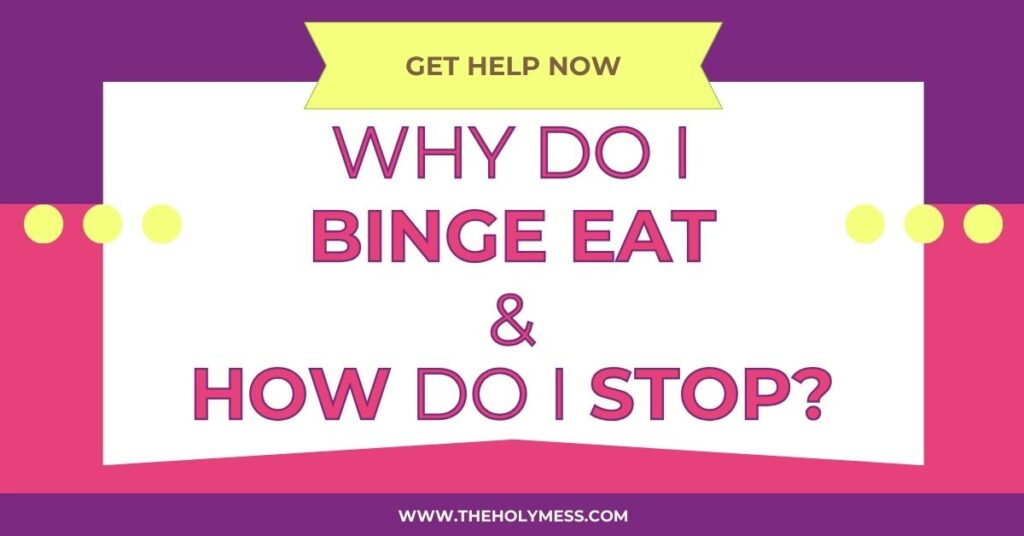
- What is Binge Eating?
- Why Do I Binge Eat?
- How Do I Stop Binge Eating? (A 5 Part Solution)
- What is Binge Eating Disorder (BED)?
- Medication for Binge Eating
- My Binge Eating Experience and Recovery
- The Danger of Binge Eating
- FREE PDF Printable: 5 Steps to Stop Binge Eating & Find Balance
- Resources for Binge Eating Recovery
What is Binge Eating?
Binge eating is compulsively consuming large amounts of food. Simply put, binging is eating to the point of pain.
Binge eating is not overeating at Thanksgiving or a restaurant meal.
Binge eating is:
- Compulsive – You feel like you have to keep eating, even if you feel physically sick.
- Ritualistic – You have specific foods and ways of eating during a binge.
- Repetitive – You engage in this behavior regularly.
- Painful – You eat to the point of physical pain, and your binging behavior causes you emotional pain.
- Secretive – You hide wrappers and receipts and buy and eat in secret.
- Fast – You eat quickly in large bites, often jumping from one type of food to another (sweet to salty, crunchy to savory, then back to sweet again).
- Zoned out – While you technically can remember what you ate, you feel like you’re in a trance and have to concentrate to remember. There’s a strong element of denial.
I’m not a doctor or therapist. I recommend seeing a medical professional. I saw a therapist for years to overcome my binge eating and compulsive overeating. Helpyourselfhelpothers.org is one place to start.
Why Do I Binge Eat?
While the answer varies, the following reasons are valid for many binge eaters.
- Genetics
- Hunger
- Habits
1. Your Genetic Tendency
For most of history, binge eating was required for survival. Calories were not always available, so eating over and above fullness was necessary to sustain life during the lean times.
Before you mentally beat yourself up over your last binge, keep in mind that just a few hundred years ago, binging was not considered a problem.
Today, most of us have an overabundance of readily available calories. Combine that with our genetic desire to binge, and the urge makes sense.
2. You are Hungry
Binge eating starts with food restriction. Whether it’s a diet attempt to lose a few pounds or a life-long struggle with body weight or obesity, calorie and food restriction is at the center of binge eating.
Many binge eaters are loathe to admit that food restriction is why they binge eat. For many years, this was me. I was overweight – how on earth could I be restricting calories?
I figured my problem was the opposite. Because my body carried extra pounds, I thought I ate too much, lacked willpower, and was pitiful regarding self-control.
Yet here’s a crazy thing. Binge eaters often have excellent self-control (almost too good). They tend to be high-achieving in other areas of life. They restrict calories and under-eat from sheer determination and willpower.
This backfires because primitive hunger takes over, which drives you to consume large amounts of calories.
Your body is brilliant, and when you are deprived of calories, it drives you to eat the highest-calorie food in your environment. That’s why binge eaters are prone to eating chips, candy, baked goods, and other calorie-dense foods.
As much as people who binge eat think that their behavior is due to personal weakness, primitive hunger is often the driving force. While there will be some behavior modification to learn, none of those techniques will work when you continue to restrict the food you consume.
3. You’ve Developed a Habit
While binge eating is often driven primarily by hunger, there is also a learned component.
Binge eating becomes a habit, and you develop tolerance for it. The more you binge, the more you need to binge to get the same high or relaxation from the behavior.
As uncomfortable and embarrassing as it is to admit, abusing food can become part of your identity. You might hate it, but you might also feel like being overweight protects you from the outside world. When people don’t like you, you have your weight to blame.
Binge eating is a way to avoid scary feelings. Binging was how I zoned out and avoided emotions that were too much for me. Until I learned to cope with all feelings (good, bad, and scary), I couldn’t stop binging and overeating to soothe them.
How Do I Stop Binge Eating? (A 5 Part Solution)
Just as the reason you binge eat is different for everyone, each person will take a different path to recovery.
Here are the five steps to stop binge eating:
- Follow a balanced food plan.
- Approach recovery with compassion.
- Manage trigger foods.
- Change your habits.
- Work to manage your emotions without food.
1. Follow a balanced food plan.
If you binge, I can almost 100% guarantee that you aren’t eating enough during the day.
I know you want to argue with me. You want to tell me that you are eating enough. You might want to say, “Sara, I’m overweight. There’s no way I’m not eating enough.”
Hear me out, friend.
After working with thousands of women, plus my own experience, I would say that almost all binge eaters are restricting food in a way that is setting them up to binge.
This isn’t about sticking to a super-strick meal plan with an exact number of points or calories. Instead, think of this as a relaxed but structured way of eating.
Structured eating means:
- Eating every 3-4 hours during the day. (Set an alarm on your phone to remind you.)
- Eating an adequate amount of calories for your body.
- Eating from all three main types of food (protein, fat, carbohydrates), ideally with every meal and snack.
- Eating breakfast.
If you track points or calories, a simple way to get started is to divide your allotted daily points or calorie allowance by four. Eat around 1/4 for breakfast, 1/4 for lunch, 1/4 for dinner, and 1/4 divided into snacks.
Breakfast is the most important meal of the day for binge eaters. Many people who binge on food overeat in the late afternoon, at bedtime, or in the middle of the night. Then, they aren’t hungry for breakfast, and the cycle starts.
This meal plan for binge eating recovery is an excellent place to start, and I recommend the S.A.F.E. method from the Binge Code Toolkit, which you can download for free.
2. Approach recovery with compassion.
I was embarrassed and ashamed of my binging behaviors. I went to great lengths to hide my behavior from others.
- As a child, I snuck food into my bedroom and hid the wrappers under my bed.
- I purchased food to replace what I binged on so my family would overlook missing items.
- In college, I hid in hallways and alcoves to secretly sneak-eat junk foods and pizza where my roommates wouldn’t see me.
- As an adult, I drove through for fast food and ate it in the car on the way home so my family wouldn’t know I ate it.
When I started therapy for weight loss, and my therapist suggested that I treat myself with compassion, I thought he was nuts. I figured compassion was the last thing I deserved. I believed the only thing that would work was to whip myself into submission.
It took years to understand that my thinking was faulty. Compassion wasn’t a nice add-on. Compassion was the key to recovery.
Releasing my perfectionistic, black-and-white thinking was necessary to develop a healthier relationship with food and my body.
For most of my life, I felt like my body betrayed me. My hunger felt rampant and extreme. My food thoughts were excessive, and my willpower was lacking.
When people talked about loving (or at least accepting) their bodies, I figured that was okay for them, but it didn’t apply to me. I was fat. Accepting my body as-is felt absurd.
Now I know that going to war with my body doesn’t work. This is the only body I’m getting, and I’ll be living it in for as long as I walk this earth, so it only makes sense to create space for peace and understanding.
3. Manage Trigger Foods
Most people who binge eat have specific foods that trigger them. These typically include fatty, salty, or sweet foods.
Ask yourself, what foods do I never allow myself to eat—except when I’m binging? Those are your trigger foods.
Trigger foods need to be handled carefully because bringing them into the house in limitless supply is asking for trouble.
Yet, never allowing them isn’t the answer either. Will you ever eat cake and ice cream again for the rest of your life? Those foods need to be introduced carefully and safely.
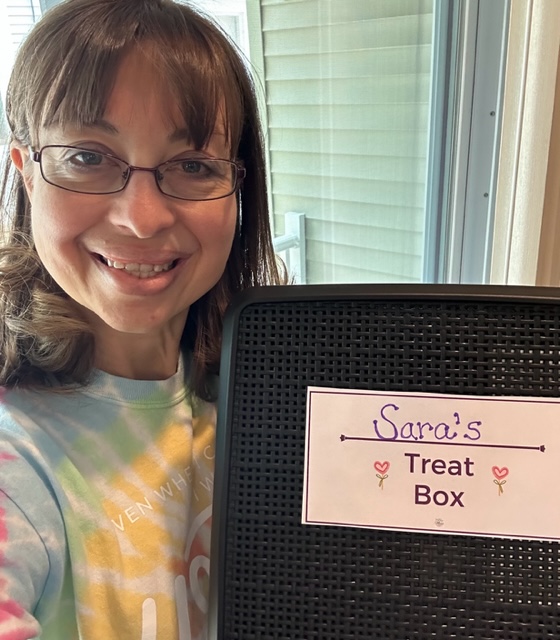
Check out The Holy Mess Treat Box and four steps to food freedom with trigger foods to create a safe plan for managing trigger foods during recovery.
4. Change Your Habits
Binging becomes a habit once you’ve been engaged in it for a while.
Changing your habits sounds easy enough, but it’s pretty challenging.
Your brain loves habits because they make you feel safe, and safety is what keeps you alive. Since safety is your brain’s top priority, it makes sense that parts of you resist habit change.
You can do it, though. Did you know binge eaters tend to be overachievers with fantastic willpower? That’s actually what got you into trouble in the first place because you had the power to withhold food from yourself in a way that other people can’t.
The good news here is that habits can be changed. What is learned can be relearned.
Don’t go big or go home (like I tend to do). Start small so that your brain doesn’t totally freak out.
Chip away at unhealthy routines, changing one habit at a time until you have created a new routine that looks nothing like the old one.
Here are some small habit changes to try:
- Eat in front of other people.
- Don’t bring trigger foods in the house; only buy one portion if you do.
- Ask someone else to do the grocery shopping for a few months, or shop with just enough cash for the required purchases.
- Remove DoorDash, Instacart, and food delivery apps from your phone.
- Drive a new route where you don’t go past your usual stores or fast food places.
- Create an evening routine that includes some calming activities that you enjoy.
5. Work to manage your emotions without food.
I figured the reason I binged was because I had deep-seated emotional problems.
Did I have issues that needed to be addressed? Sure, but who doesn’t? There are plenty of people who have serious mental health issues, and they don’t binge eat. So, emotional eating is part of binge eating, but it’s not the whole story.
I used food to zone out and not think or feel. When my kids stressed me out or a phone call with my mother sent me into an emotion tailspin, food was there to soothe me.
I hated my binge eating behavior. The out-of-control feeling was scary, and I often went to bed feeling physically sick. I felt panicked and guilty every time I had to buy a larger clothing size.
But then again, I found myself turning to food again and again because as scary as binge eating was, feeling those huge emotions seemed worse.
Take it once small step at a time, but start to check in with yourself.
Feeling your feelings seems overwhelming at first, but the more you practice, the easier it becomes. Soon you’ll learn that it’s just a feeling, and it can’t harm you.
Read this post about your toddler vs adult voice for emotional eating if this is an area where you want more support.
Instead of using food to tune out, start to tune in. Tune in to your body, your hunger, and your feelings.
What is Binge Eating Disorder (BED)?
Binge eating disorder is when a person goes on eating binges regularly, defined as binging at least once a week for a period of 3 months.
Here is a link to the symptoms of binge eating disorder.
Some people feel the urge to purge (often by vomiting), which is the eating disorder of bulimia. Undereating is a different eating disorder (anorexia).
Many people binge eat regularly but do not realize they have this condition. Binge eating is seen across all age groups and ethnicities, although it’s widespread in women. Many people suffer in silence for years or even decades.
Medication for Binge Eating
Vyvance is a medication that is approved for the treatment of Binge Eating Disorder (BED).
GLP-1 medications are currently being tested for the treatment of binge eating, since some people have found that they stop binging when they start taking them. More research is needed in this area.
Some people have found relief from binge eating when they treat other co-existing conditions, like ADHD or depression.
If you feel like medication might be helpful for you, contact your doctor.
My Binge Eating Experience and Recovery
I was a compulsive overeater and a binge eater. I was a binge eater long after I lost weight, too. I kept right on binge eating.
It’s challenging to find a healthy balance because dieting perpetuates binge eating.
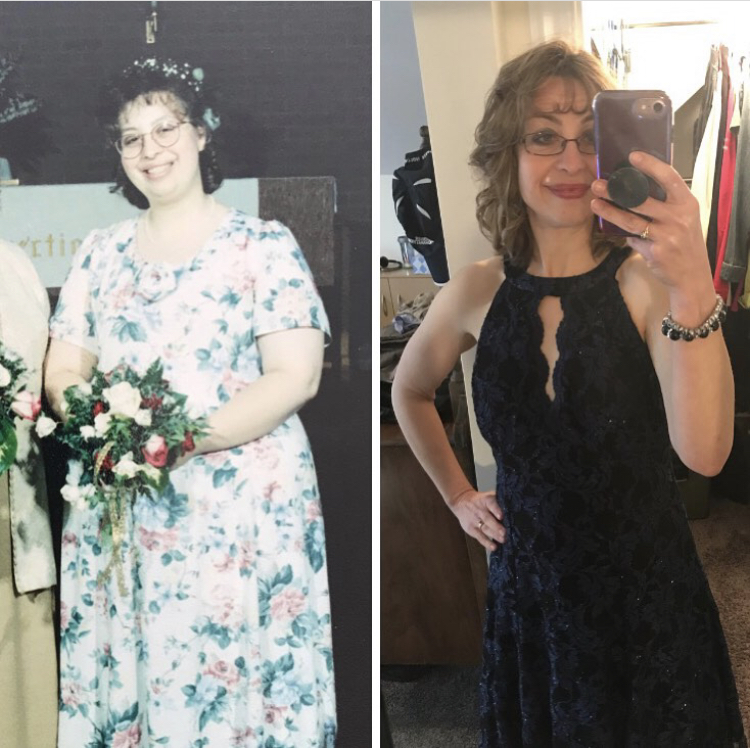
Binge eating is destructive, and learning to manage it was the best thing I have ever done for myself when it comes to my health, weight loss, and emotional well-being.
For this reason, I’m not a fan of cheat meals, weekends off-diet, cleanses, or anything very extreme. Other people might be able to handle these things, but I have to be more careful.
The Danger of Binge Eating
Besides the obvious reasons not to binge eat — the significant physical and emotional damage it causes, it took a severe reality check to stop my binge eating.
Honestly, I was able to lose weight still and continue binge eating. It wasn’t good for me, and I knew it, but I kept doing it.
It took a doctor sitting down with me and explaining just how many calories I consumed during a binge for me to understand what I was doing to myself.
What Happens to Calories from a Binge?
If I ate 3,000 calories during a binge—which is not that hard to do, believe me—but then was “good” the rest of the week, I might still be over my calories for the week and end up gaining or maintaining my weight.
This seemed incredibly unfair to me. A 3,000-calorie cheat meal or binge session means you have to eat 428 calories less per day for the rest of the week. If you are eating a 1,800-calorie diet, you now need to eat a 1,400-calorie diet. If you are eating a 1,400-calorie diet, now you need to eat a 1,000-calorie diet in order to see fat loss.
Whoa.
Honestly, my denial was so strong that I would go on an eating binge and then (sort of) forget I did it. I didn’t forget, but I put it out of my mind.
That’s denial.
Consider this scenario:
You go on an all-out food bender on a Saturday night. Sure, you are stuffed and uncomfortable, but just that one big meal and a few drinks doesn’t seem like it could derail your whole week, right? If you’ve been on track with healthy eating the rest of the days, I bet you would say you’ve had a fabulous week of staying on the program and deserve a good weight loss.
You check your weight the following Monday. Your weight stays the same, or you may even gain weight. Now you are upset!
The next day, when you overhear friends discussing hormones, metabolism, genetics, and how they just can’t lose any weight, you say, “Yeah, that must be my problem!”
After all, you’ve been so good all week long—salads and oatmeal. Okay, there was that one-weekend splurge, but just that one…
But the math doesn’t lie. Your body is the only perfect machine that never gets it wrong. Your body is counting calories whether you are or not.
Binge Eating Recovery
When I started therapy, my therapist asked me to list the foods I ate during my last binge. (OMGoodness, I hated the man that day.) I know I lied and didn’t tell him everything. It was simply too painful to face reality.
Recovery from binge eating is possible. Be compassionate with yourself. These habits develop over time, and learning new, healthier habits will take time.
Focus on adding a new healthy habit each day or strengthening one you are working on. In time, you will see tremendous growth.
Do you struggle with binge eating? As you feel comfortable, share your thoughts in the comments below.
FREE PDF Printable: 5 Steps to Stop Binge Eating & Find Balance
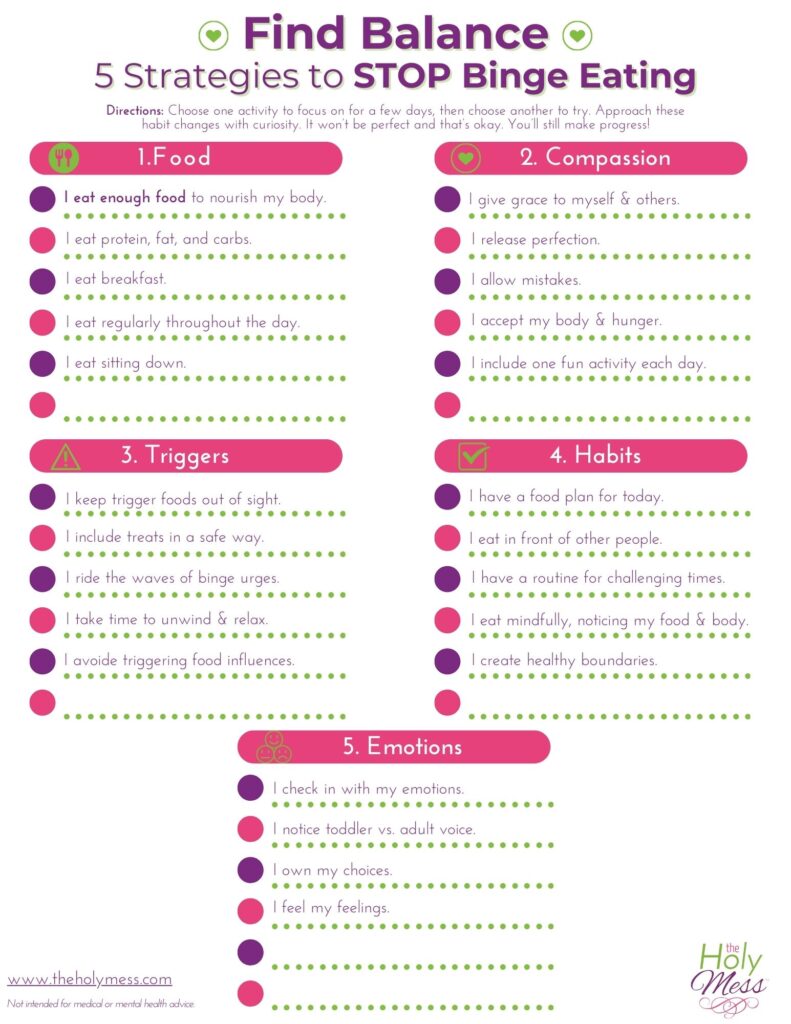
$0.00 – Click the “Add to Cart” button to download this printable guide.

Resources for Binge Eating Recovery
Recovery Coaching for Binge Eating
The Binge Code Resources – Check out their free toolkit, courses, and books.
How to Get Back on Track After Binge Eating
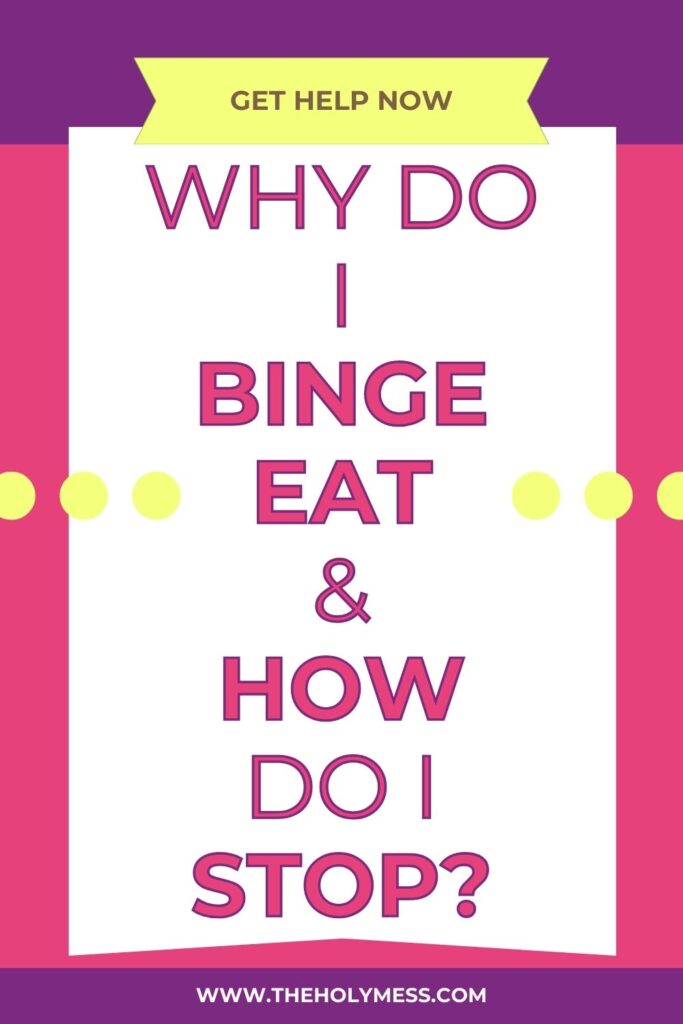
Free 1 Week Course!

Real Fitness. Healthy Eating. New You.
The Busy Woman's Mini-Course.







Leave a Reply